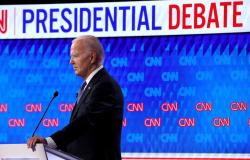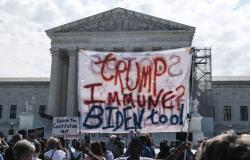Indian Prime Minister Narendra Modi is forced to form a coalition government for his third term. This the day after his victory in the legislative elections which, far from being overwhelming, saw him lose his absolute majority in Parliament.
The ruling Hindu nationalist Bharatiya Janata Party (BJP) has lost the large majority in Parliament it enjoyed during its first two terms, according to results released on Tuesday.
Even without the tidal wave in his favor predicted by most political analysts, he should begin his third term thanks to an alliance of small parties.
The 73-year-old leader celebrated the victory on Tuesday evening, believing that the result of the election allowed him to pursue his program, while his supporters celebrated the event throughout the country.
“This third term will be one of big decisions. The country will write a new chapter in its development. I guarantee it,” Mr. Modi told a crowd of cheering supporters in the capital, New Delhi.
“Constant worry”
The BJP won 240 seats in Parliament, 32 seats short of an absolute majority and significantly below the 303 seats won in 2019.
Against all expectations, the Congress, the main opposition party, acquired 99 seats, almost doubling its 2019 score (52 seats). “The country told Narendra Modi: ‘We don’t want you,'” said the opposition leader, re-elected handily in the southern constituency of Wayanad.
Most analysts and exit polls had predicted the triumph of Narendra Modi, accused by his detractors of exploiting justice with the imprisonment of opposition leaders and of flouting the rights of religious minorities, including more of 200 million Muslim Indians.
Seek consensus
The Prime Minister was re-elected in his Varanasi constituency with a much smaller margin than five years ago. Now dependent on its coalition allies, the BJP will have to seek consensus to get its texts voted on in Parliament.
“The possibility that they will use their influence, encouraged by proposals from the Congress party and other members of the opposition, will be a Source of constant concern for the BJP”, underlines the daily Times of India.
According to Hartosh Singh Bal, political journalist for The Caravan magazine, Mr Modi must now “work with his alliance partners (…) who can withdraw at any time”.
“Moral defeat”
The festivities had started on Tuesday at Modi’s BJP headquarters well before the results were finally announced.
The Congress headquarters in New Delhi was also jubilant. “The BJP failed to secure a large majority on its own,” Congress MP Rajeev Shukla told reporters. “It’s a moral defeat for them.”
The opposition has struggled in the face of the powerful, well-funded BJP campaign machine and legal proceedings against several of its leaders.
The Muslim minority has expressed concern for its future and that of India’s secular Constitution which the Hindu nationalist agenda appears to threaten.
Two of the elected independent MPs are currently serving a prison sentence: Sikh separatist Amritpal Singh and Kashmiri Sheikh Abdul Rashid, arrested for “financing terrorism” and money laundering in 2019.
Fall of the stock market
The Indian stock market fell on Tuesday in reaction to the less good result than expected from the BJP.
Ukrainian President Volodymyr Zelensky on Wednesday congratulated the Indian Prime Minister on his coalition’s victory, emphasizing “the weight and importance of India in world affairs.”
Japan also congratulated the Prime Minister’s coalition on its victory in the legislative elections, calling the country an “important partner” for Tokyo.
Some 642 million Indians voted in this election which took place in seven phases, spread over a period of six weeks.
Based on the 968 million registered voters, the turnout rate stood at 66.3% according to the electoral commission, a drop of around one percentage point compared to the 67.4% recorded in 2019.
Analysts have partly attributed the drop in participation to a succession of scorching heatwaves in northern India, with temperatures sometimes exceeding 45°C.
ats, afp






